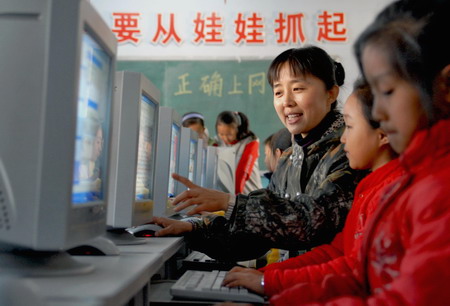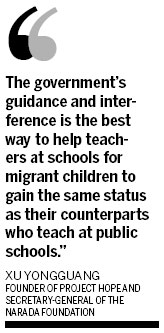Economy
Lessons in educating migrants
By Wang Wei (China Daily)
Updated: 2010-12-20 14:20
 |
Large Medium Small |
|
 |
|
A teacher showing migrant children how to use the Internet. Teachers at schools for migrant children need lots of help from society in terms of being held in esteem. [Photo / China Daily] |

BEIJING - During the day, Dong Dandan, 25 is a teacher at a school for the children of migrant workers in the Chinese capital's Haidian district. In the evening, she sells sweetcorn by a bus stop. During the winter holiday she becomes a nanny at a retired soldiers' home.
It's not that she particularly likes job variety. She needs money desperately to cure her sick brother and sister. Her teaching job only pays 1,100 yuan($164.51) a month, which is not enough to make ends meet for her family, let alone to pay the huge medical expenses.
The thought of quitting the teaching job and finding one that pays more has been on her mind since she discovered her younger sister had a tumor and her younger brother last year developed leucoderma, also known as vitiligo, a skin disease characterized by white spots and patches on the skin.
When she bade her class farewell, her students jumped from their chairs to hug her and begged her not to leave. She instantly changed her mind when she heard students saying, "Teacher, please don't go. We will behave and never make you angry again."
"I really need lots of money. But I can't leave my job because of these cute and smart children," she said.
Because of Dong's outstanding contribution to the migrant children community, she, together with six other teachers, was awarded a gold chalk prize on Dec 5 by the Narada Foundation, a private organization focusing on the education of migrant children.
A further 29 teachers across China were awarded silver chalk prizes and 185 teachers received bronze chalk prizes to honor their remarkable dedication to migrant children.
Low pay is the cruel reality facing thousands of teachers at schools for migrant children. Small nongovernmental organizations are perhaps the only group that pays much attention to this vulnerable sector who devote their love, energy and time to the development of these youngsters. In return for their hard work the teachers are discriminated against by city dwellers and neglected by the government.
The joy of pregnancy for Dong Shizhen didn't last long. The teacher works at a migrant children's school in Shanghai. She was fired a few days before taking maternity leave. The reason the school gave was that it couldn't afford teachers who couldn't teach.
Feeling disappointed, she took classes and corrected students' homework until just before she gave birth.
After having her baby, she heard that the teacher who replaced her wasn't very experienced and responsible and even had a few clashes with her former students.
She put aside her anger and disappointment toward the school and went back to teach again without hesitation.
"What I care about the most is my students' development. If they need me, I will be there even at the expense of my pride," she said.
Chinese sociologists suggest the problems that the large number of migrant workers and their families are facing should be taken into consideration in order to build a harmonious society - a concept put forward by Chinese president Hu Jintao. It is reported that China has 80 million children of migrant workers aged between 6 and 14. Sixty million were left in their hometown and the rest moved to major cities with their parents.
It is the selfless contribution of teachers at schools for migrant children that ensure these underprivileged children can receive an education, said Xu Yongguang, founder of Project Hope and secretary-general of the Narada Foundation.
"The government's guidance and interference is the best way to help teachers at schools for migrant children to gain the same status as their counterparts who teach at public schools," he added.



